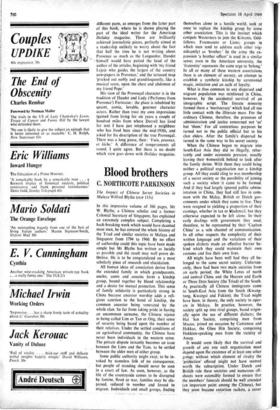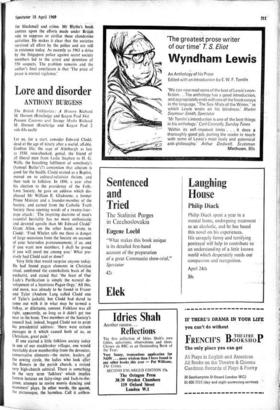The Impact of Chinese Secret Societies in Malaya Wilfred Blythe
(ouP 115s)
Blood brothers
C. NORTHCOTE PARKINSON
In this impressive volume of 566 pages, Mr W. Blythe, a Chinese scholar and a former Colonial Secretary of Singapore, has explained an extremely complex subject. Completing a back-breaking work which would have daunted most men, he has covered the whole history of the Triad and similar societies in Malaya and Singapore from 1794 to 1960. By no effort of authorship could this topic have been made simple but Mr Blythe has written as lucidly as possible and the result may well prove de- finitive. He is to be congratulated on a most scholarly piece of research and elucidation.
All human ideas of association derive from the extended family in which grandparents, uncles, aunts and cousins form a kinship group, bound together by blood relationship and a desire for mutual protection. This sense of family solidarity is particularly strong in China because ancestor worship adds a reli- gious sanction to the bond of kinship, the common ancestor being venerated by the whole clan. So far from taking pride in having an uncommon surname, the Chinese rejoice in being called Lim or Tan or Ong, their sense of security being based upon the number of their relatives. Under the settled conditions of an agricultural community, the Chinese have never been individuals in the western sense. The private dispute instantly becomes an issue between the Lims and the Tans, to be settled between the older men of either group.
Some public authority might exist, to be in- voked by nameless folk of no consequence, but people of standing should never be seen in a court of law. As soon, however, as the life of the countryside comes to be disrupted by famine, flood or war, families may be dis- persed, reduced in number and forced to migrate. Individuals and small groups, finding
themselves alone in a hostile world, seek at once to replace the kinship group by some other association. This is the instinct which compels Westerners to join the Kiwanis, Odd- fellows. Freemasons or Lions; groups in which men tend to address each other (sig- nificantly) as 'brother.' In the army the ex- pression `a brother officer' is used in a similar sense; even -in the American university, the `fraternity' represents the same urge to `belong.' In all or many of these western associations there is an element of secrecy, an attempt to establish a synthetic kinship by ceremonial magic, initiation and an oath of loyalty.
What is thus common to any dispersed and migrant population was reinforced in China, however, by the accidental survival of an ideographic script. The literate minority formed there a 'meritocracy' which had all too little contact with the illiterate mass. For the ordinary Chinese, therefore, the processes of administration and justice concerned not `us' but `them.' For. all contentious purposes he turned not to the public official but to his clan elders. After the family's dispersal he turned in the same way to his secret society.
When the Chinese began to migrate into South-East Asia they did so illegally, reluc- tantly and under economic pressure, usually leaving their *omenfolk behind to look after the family shrine. With them they could bring neither a political organisation nor a kinship group. All they could cling to was membership of a secret society or the possibility of joining such a society when it came to be formed. And if they had largely ignored public admin- istration in China, they had still less in com- mon with the Malay, British or Dutch gov- ernments under which they came to live. They were resigned to yielding a proportion of their earnings, whether in tax or blackmail, but they otherwise expected to be left alone. In 'their early dealings with government -they used, therefore, to be represented by their `Capitan China' as a sole channel of communication. In all other respects the complexity of their written language and the variations of their spoken dialects made an effective barrier be- hind which they could maintain their own customs and live their own lives.
All might have been well had they all be- longed to the same secret society. Unfortun- ately, there had been two main societies from an early period; the White Lotus of north and central China and the Heaven and Earth or Three Dots Society (the Triad) of the South. As practically all Chinese immigrants came to South-East Asia from the South (Kwang- tung, Kwangsi and Fukien), the Triad might have been, in theory, the only society to oper- ate in Malaya. In practice, however, the society split up into rival groups, based origin- ally upon the use of different dialects; the Hai San Society, comprising men from Macao, joined on occasion by Cantonese and Hakkas, the Ghee Hin Society, comprising Hokkien-speaking men from the vicinity of Amoy.
It would seem likely that the survival and growth of any one such organisation must depend upon the existence of at least one other grow; without which element of rivalry the 'protection' offered might not have seemed worth the subscription. Under Dutch and British rule these societies and numerous off- shoots were ostensibly formed to ensure that the members' funerals should be well attended (an important point among the Chinese), but they soon became extortion rackets, a cover
for blackmail and crime. Mr Blythe's book centres upon the efforts made under Brit ph rule to suppress or civilise these clandestine activities. He makes it clear that the societies survived all effort by the police and are still in existence today. As recently as 1963 a drive by the Singapore police against secret society members led to the arrest and detention of 550 suspects. The problem remains and the author's final conclusion is that 'The price of peace is eternal vigilance.'











































 Previous page
Previous page